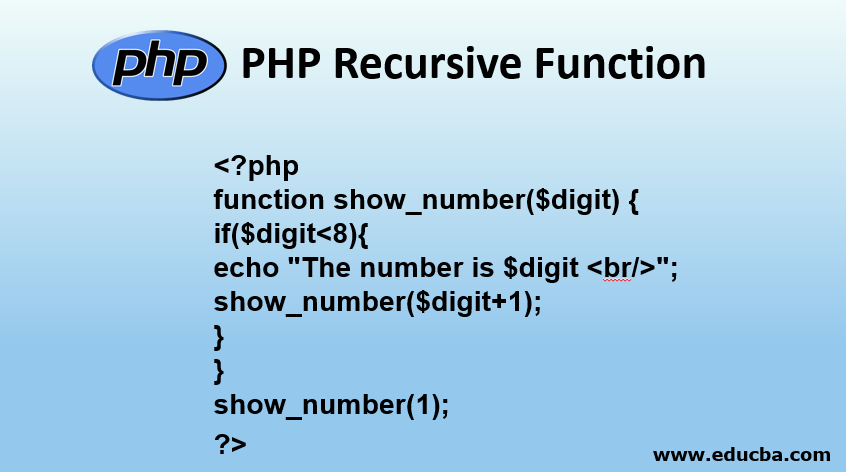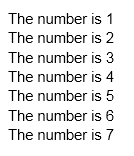
Introduction to PHP Recursive Function
The programming languages provide the use of several functionalities that enable us to develop simple and complicated applications. The functionalities have been implemented in the program using keywords that are written in the statement to satisfy the requirement. The functionalities endorse the application development, which is facilitated by the logic. In this article, we are going to learn about PHP Recursive Function. Recursion may be considered an approach that lets us call the function by the statement written. Recursion is the functionality that is supported by languages like C/C++. We will be implementing recursion in PHP using the function. Before we get into the depth of recursion, keep in mind that the actual meaning of recursion is in programming terms. Below we are learning about PHP recursive function examples:
Examples of PHP Recursive Function
Below are the examples of PHP recursive functions:
1. Program to Print Number
To understand the concept of recursion, let us consider some examples. In this example, we will be using the method to print the number, but the only way it will be different from the other program is by the use of recursion in this. This is because we will be calling the function from the statement defined within the same function. To provide the functionality of recursion, we will be putting the login in the way so that it calls the function over and over till a particular condition gets satisfied. In normal cases where we need to implement the recursion, we simply do that by using the loop, but when it comes to implementing the concept of looping without the loop, we can achieve the same functionality using the recursion.
The example that we are going to use in printing the numbers will be very useful to use to perform recursion without using the loop statement. The program will first define the function that will be used to implement the recursion mechanism. The program will be having the function within it with the same name, and that function will be called by using the function defined within it. Though the below program looks simple, it will be very helpful to fortify your understanding of recursive functions. Below is the code of the program that will be used to print the numbers.
Code:
<?php
function show_number($digit) {
if($digit<8){
echo "The number is $digit <br/>";
show_number($digit+1);
}
}
show_number(1);
?>This program will be printing the number from one to seven, and the string “The number is” will be there before the number is printed. In this program, the function used to print the number is name show_number, and the digit is the name of the variable that will help the show_number function get some value that will eventually lead to invoking it. The IF statement is used to perform the condition checking. The program will keep on executing until the fixed value is stored in the digit variable is less than eight. Once the value stored in it exceeds the value of seven, the condition that must be satisfied to execute the program further will go false, and the program will be terminated. Below is the output of this program.
Output:

2. Program to Find Factorial Number by Recursive Function
In the last program, we learned how to leverage recursion to print the number. Now in this program, we will learn how to change the logic of the application to find the factorial. Before we begin to write code for calculating factorial, it is important to understand what is factorial. Factorial of any number is the value which is obtained by reducing the number by one and then multiplying the outcome by the number, and it has to be repeated till one. For example, if we need to calculate the factorial of 4, it can be calculated using 4*3*2*1. So the outcome will be 24. In the below program, the value will be given in the program. The program will process the value to calculate the outcome of the factorial. The value will be passed through the function, and then all the logic is written will be imposed on it to calculate the outcome. Below is the program, so let’s proceed to have a look at it.
Code:
<?php
function calculate_fact($val)
{
if ($val === 0)
{
return 1;
}
else
{
return $val * calculate_fact($val-1);
}
}
echo "The factorial is of the given number is". calculate_fact(4);
?>Output:
![]()
The above-written code is the implementation of the factorial using PHP. The name of the function is calculate_fact that will be used to calculate the factorial. The function with the same name has been called within it that is used to implement the mechanism of factorial in the program. Val is the variable that will be storing the value of which we have to find the factorial. We have used the IF condition checking to make sure that it is meeting the requirements that are considered essential when it comes to calculating the factorial of any value. In the very last line, the main call of the calculate_fact function has been done that has invoked the functionality defined in this function. At this time, we have passed four as we wanted to calculate the factorial of four. In case if you want to try this code with different values and replace the digit 4 in this program with the value of which you want to find the factorial.
Conclusion
The function recursion is considered something very useful when there is any need in the program to bring the recursion functionality without using the loops. Though we have used two of the simple programs that use recursion to calculate the factorial and print the numbers, there are way too many features introduced in the application using this function recursion.
Recommended Article
This is a guide to PHP Recursive Function. Here we discuss the introduction to PHP Recursive Function examples along with code implementation and output. You can also go through our other suggested articles to learn more –


